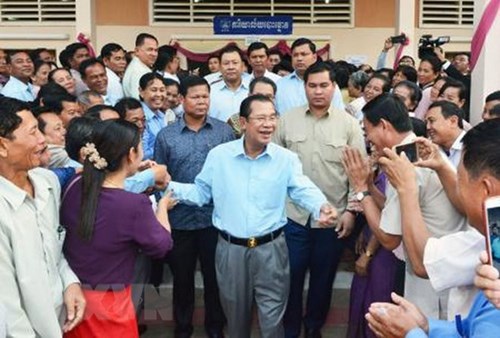The NEC held question-and-answer sessions with about 800 students in the Southwestern province of Takeo, following a lecture about the vote.
The campaign will also feature television programs to increase awareness about voting rights and the identity documents voters need to take to polling stations.
The NEC began registering political parties for the upcoming election on April 30 and the registration will end on May 14.
    |
 |
|
Cambodian Prime Minister Hun Sen meets with his supporters after casting his ballot in the Senate election in Kandai province on February 25. Photo: Kyodo/VNA |
To date, three political parties, namely the ruling Cambodian People's Party (CPP), the Cambodian Nationality Party, and the Cambodian Youth Party, had already registered to contest in the election, the NEC said, adding that 16 other political parties had contacted the NEC for application forms.
The CPP of Prime Minister Hun Sen is forecast to continue winning the upcoming general election as the main opposition Cambodian National Rescue Party (CNRP) was dissolved in November 2017 by the Supreme Court after its leader Kem Sokha, Sam Rainsy's successor, was arrested on September 3 last year and charged with "treason" for conspiring with a foreign power in an attempt to overthrow the government.
In addition, 118 senior members of the CNRP have been prohibited from taking part in political activities for five years.
Sam Rainsy has been living in self-imposed exile in France since 2015 to avoid at least eight-year-prison sentence for defamation and incitement cases.
The NEC warned that anyone preventing voters from casting their ballots would be fined and face criminal charges.
In the last election on July 28, 2013, eight political parties joined the contest. As a result, the CPP won 68 parliamentary seats against 55 seats for the CNRP in the 123-seat parliament. In the July 29 election, Cambodian voters will elect 125 parliamentarians.
Source: VNA